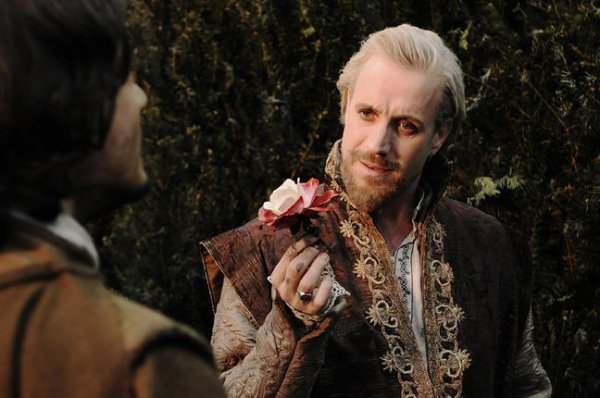|
Anonymous
Reviewed
by
Damien Straker on
November 1st, 2011
Sony Pictures presents
a film directed by
Roland
Emmerich
Screenplay
by
John
Orloff
Starring:
Rhys
Ifans, Sebastian Armesto, Rafe Spall and Vanessa Redgrave
Running
Time:
130 mins
Rating:
M
Released:
November 3rd,
2011
|
5/10
|
|
A
man introduces
a modern play, detailing how everyone has been fooled about who
Shakespeare was
and suggesting that someone else wrote all of his most famous texts.
This story
is then projected back in Elizabethan England, as we are introduced to
a
playwright named Ben Jonson (Sebastian Armesto), who is being hunted
down. The
story then cuts back again to an earlier period where Jonson is called
upon by
Edward de Vere (Rhys Ifans). De Vere realises that he can inspire
political
movements by using the plays to sway the public. Given politically
inclined art
is outlawed, he forces Jonson to attach his own name to the works. Yet
Jonson
is overshadowed by William Shakespeare (Rafe Spall), a buffoon who
jumps on the
stage at the end of a production, claiming authorship over it. He
successfully
blackmails the Earl, threatening to announce the truth if he isn’t
paid.
Meanwhile, the Earl is caught up in a conspiracy involving Queen
Elizabeth I
(Vanessa Redgrave) and a number of figures who are looking to become
her
successor.

Roland
Emmerich is a director who revels in disasters. Some are intentional,
like the
sci-fi epic Independence Day (1996)
and others, like Godzilla (1998), are
just plain bad. Anonymous is
Emmerich’s most mature film so far. It’s handsomely crafted, offering
the scale
of a medieval epic and yet it’s efficiently acted to resemble more of a
closed
door conspiracy thriller. For all of Anonymous’
qualities, of which there are many, it’s a near impenetrable film. A
fascinating premise is undone by a narrative so clumsily told and
convoluted
that on first viewing it is impossible to realise how any of these
characters
relate to one another and what is going on. The film is inept with its
time
frames. The opening quarter alone shifts between three or four
different
periods, using flashbacks and moving the narrative backwards and
forwards in
time. The narrative is disjointed without any clear reasoning. There
are two
major threads running throughout the film but they’re not given equal
weight.
The film has advertised the focus on Jonson and Shakespeare but much of
the
story is actually devoted to the conspiracy involving the Queen. This
is
problematic for a number of reasons. It leaves the parallels between
the two
strands thinly stretched, scarcely determining that two different men
forgo an
opportunity for greatness in the public eye. It also means the film
scattershot
in perspective too. Characters fade in and out of the story, with less
interesting figures taking up ample screen time. It’s a common ploy in
Emmerich’s
film to use a broad spectrum of figures because it enlarges the
landscapes of
his narratives. It was sufficient in Independence Day as the archetypes were
visible.

A
lot of
the side characters here are only vaguely established, making the story
opaque
when it chooses to focus on them. Rhys Ifans brings power and
conviction to his
role but he fades in and out of the story and has less dialogue than we
would
like when he’s on screen. He still has the best line in the film when
he says:
“All artists have something to say. Or they’d make shoes”. Neither of
the two
writers are particularly well developed though, with Spall’s comic
relief
at odds with the darkness of the rest of the film. There are still some
spectacular moments that demonstrate Emmerich’s visual flair. His use
of use of
establishment shots is distractingly frequent but he draws some
striking
images. The fog over the river and the snow falling on the cityscapes
gives the
film an occasionally chilling atmosphere. And there are fine touches,
like when
the film montages through many of Shakespeare’s most famous works on
stage,
glimpsing several masterworks. It is extraordinary to consider how some
of the
greatest texts of all time were written not only without computers or
word
processors but even ordinary pens too, leaving merely the brush of a
quill on
loose sheets of parchment to preserve these texts over time. Perhaps in
calling
this film ‘Anonymous’, Emmerich is
alluding to appropriation: the name of a text or an author is
irrelevant if the
essence of a classic Shakespearean tragedy is retained at the core of
the
narrative. That’s captured somewhere in this film too but Emmerich
can’t
unscramble the labyrinth with any cohesion. It’s a rare case of a film
that
might improve on multiple viewings but on an initial screening it is
difficult
to recommend this beautiful but long-winded thriller.
|